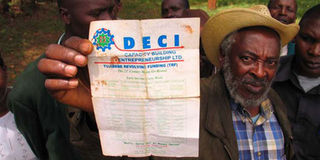Scam victims’ long wait for justice

Investors of the collapsed Deci pyramid scheme protest in Nyeri Town. The scheme, which had 93,485 investors, went under with Sh2.5 billion. PHOTO | FILE | NATION MEDIA GROUP
What you need to know:
- The last wave of pyramid schemes in Kenya took place in 2006, when investors lost an estimated Sh8 billion in the Ponzi-like schemes.
- Although it recommended criminal prosecution of the fraudsters, so far most of them continue to walk free.
- The victims also sued the Central Bank of Kenya for failing to protect them.
- The pyramid schemes had used legal loopholes to register their companies as limited liability firms or as co-operative societies.
The last wave of pyramid schemes in Kenya took place in 2006, when investors lost an estimated Sh8 billion in the Ponzi-like schemes.
The biggest of this was Deci, led by the late George Donde and which had 93,485 investors. It went under with Sh2.5 billion.
The next was Clip Investment, of Mr Peter Alfred Ndakwe and which vanished with Sh1.9 billion before resurfacing in Panama, where he opened bank accounts to hide his heist. He has never been arrested.
Following a wave of complaints from the public over the Ponzi schemes, the then Minister for Co-operative Development, Mr Joe Nyagah, appointed a task force headed by Mr Francis Nyenze, the current Leader of Minority in the National Assembly, to investigate the vice. It found that pyramid schemes such as Clip and Deci used religion to lure their unsuspecting ‘investors’.
“Biblical teachings and Christian literature were used as a tool for convincing the religious leaders that the schemes would benefit members both economically and in their Christian faith,” says the Nyenze report.
Muslims did not fall prey to the schemes, as it is forbidden in their religion to earn money through interest, according to the report.
The commission, after investigations, discovered that 270 pyramid schemes were in operation in the country and came up with various recommendations to stop the vice.
Although it recommended criminal prosecution of the fraudsters, so far most of them continue to walk free.
The Attorney-General was also to institute immediate criminal prosecution of all directors, proprietors or officials who were engaged in pyramid schemes.
The report also asked the victims of the pyramid schemes to institute civil proceedings against the directors to recover their lost funds.
The victims also sued the Central Bank of Kenya for failing to protect them.
The Nyenze report called for the strengthening of the law to provide for the immediate amendment of the Penal Code (Cap 63) so as to make provisions for the prohibition of promotion or taking part in pyramid schemes.
It also called for the enactment of an Anti-Pyramid Schemes Act to outlaw all aspects relating to dealings.
The Directorate of Criminal Investigations was to complete investigations on the bank accounts of the swindlers and trace assets acquired from proceeds of pyramid schemes within a year with a view of recovering them and giving restitution to the victims.
VICTIMS STILL WAITING
But so far, victims are still waiting to get their money back.
A trust fund was supposed to be set up under the Ministry of Co-operative Development to manage funds and properties recovered.
It was suggested that members of the fund should include other relevant government ministries, agencies and reputable Kenyans.
The task force also proposed that a judicial commission of inquiry be formed to undertake further investigations aimed at tracing funds and assets.
The pyramid schemes had used legal loopholes to register their companies as limited liability firms or as co-operative societies.
These included Clip Investment Sacco Society Ltd and Kings Script Publishers Ltd, Deci and Tujibebe Sacco Society Ltd, Jitegemee Entrepreneurs Sacco Ltd and Mont Blanc Afrique Ltd, Kenya Business Community Sacco and Kenya Multipurpose Business Ltd, Sasanet Investment Sacco Society and Sasanet Investment Ltd.
The top 12 companies found to be pyramid schemes or pyramid-related by the commission were led by Deci, which had 93,485 investors and had accumulated almost Sh2.5 billion. Clip Investments had 5,846 investors and Sh1.9 billion and Kenya Business Community 921 investors and Sh780.7 million in investments.
The other top schemes were Sasanet, Jitegemee, Circuit Investment, Family In Need Organisation, Global Entrepreneurship, Spell Investment, Mont Blanc Afrique, Amity Investment and Smart Welfare.
The total amount of money invested in the 12 listed pyramid schemes was close to Sh7.5 billion. By the end of the taskforce’s mandate, the total amount owed to the investors of the pyramid schemes amounted to Sh8.1 billion.





